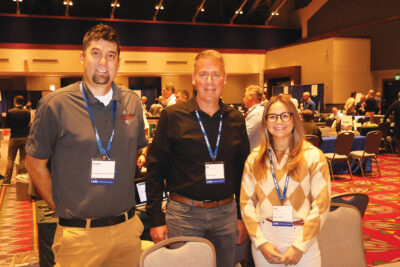
Executive Director
North American Forest Foundation
Closing the skills gap is more than a popular media topic; it’s a daily concern for many of us in the forest products industry, especially as we think about what it will take to maintain sustainable business operations into the future. Some might say let the “professionals” deal with it–that is, the school systems and education programs “out there.” But schools can’t do it alone.
The wood and forest products industry has a fundamental interest in cultivating and developing the talent needed to handle the jobs that are open, and knowledge that can help educators. We have a responsibility to continue planting seeds of career interest in the hearts and minds of current and future generations, the same way that we diligently plant billions of seedlings every year to ensure future growth for tomorrow.
Sometimes we need examples to show us the possibilities that exist around us and open our minds to connecting the dots for our own businesses.
NAFF Stays Focused On Educating The Next Generation
In addition to our role as an industry advocate, we provide educational tools provided free of charge to classroom teachers of grades K-5. Teachers can use our signature Truth About Trees kits
as springboards for discussion and deeper learning. Our next step is in the works–a gamified app directed toward junior high school students– that nudges them further along the path of understanding.
We’re not the only ones helping to cultivate a healthier future. In fact, we’re inspired by the work of other organizations: UFP Business School, River Parishes Community College, and companies like Frank Miller Lumber are jumping in to change the trajectory of the industry by inspiring fresh interest in jobs and career paths that too easily are overlooked in the traditional school curriculum or daily conversation of the wider population.
Two Years to a Bachelor of Business Administration + Rewarding Career – With Zero a Rewarding Career – With Zero Debt
The UFP Business School has created a new model for education and career success. With a cycle of courses year-round for two years, the program is accelerated, delivering hands-on experience that com- bines paid work with education.
What’s more, the 25 students entering this program each year won’t be saddled with college debt. Instead, students who are accepted into the program are employed by UFP and receive 100 percent scholarships into the Business School.
Instructors in this program are all practitioners currently working for UFP in the field in which they teach: finance, production management, plant management, design, marketing, sales, maintenance engineering and IT.
Ann Baker, Dean of the UFP Business School says, “Not only does this reflect a commitment to real world experience, but it also testifies to the commitment of the executives who dedicate time and resources to the program.”
During the summer session students are placed in six-week immersive internships in the field–at any one of 14 plants throughout the company. Cycling through work and study experiences that give them an intensive, application-rich education. Baker adds that, “the problems they address are real; the results they achieve are real; and upon graduation they are ready to step into a career path that moves them ahead.”
Interested in the possibilities? Reach out to Ann Baker, Ann.Baker@ufpi.com, to find out how the program works in detail.
Targeted Educational Partnerships with Industry Bring Career Opportunities to Students
While River Parishes Community College (RPCC) in Gonzales, Louisiana does not specifically serve the wood products industry, it does serve a region with a similar challenge: stable, high-paying, secure jobs go begging because people don’t realize the opportunities exist.
RPCC is located in an area of heavy advanced manufacturing with a high presence of petrochemical, oil, and gas companies. Not only are children unaware of the possible careers they could one day pursue, but many of the adults around them – including teachers and counselors – don’t realize the opportunities that surround them.
Under the leadership of Chancellor Quintin Taylor, RPCC is taking intentional steps to build for the future. They asked their industry partners some key questions:
• Where are we meeting the mark, where are we falling short?
• Where are our greatest areas of opportunity for growth?
• How do we become the preferred workplace solution for industry partners?
RPCC’s response has been to adapt the curriculum to align with the talent and skills development needed now and in the future as the industry changes. This includes stackable credentials that can be earned in anywhere from two months to two years and immediately put to use on the job.
Taylor notes the strong influence teachers and counselors have on students and has positioned RPCC to provide them with the information and experiences that help them understand regional industries. With that deeper grasp of potential opportunities, they can in turn share that information with students.
RPCC is intentional in taking other steps to reach younger generations as well. Working with the feeder system of schools in the region, RPCC is participating in providing age-appropriate education for children in grades K-3 so that their eyes are open to the full breadth of careers that could be open to them in the future.
Where can you partner with a community college or educational program in your region? Don’t wait to be asked, do the asking.
Frank Miller Lumber Understands the Value of Focusing on Succession and Business Sustainability
Steve James, President and CEO of Frank Miller Lumber in Union City, Indiana believes it’s vital to be actively involved in partnership with local schools – – elementary as well as high school. He describes several outreach and educational efforts that are in the works with the school systems in his region.
● Created an immersive, virtual reality experience that allows 8th graders to tour the plant and explore the kinds of jobs that are available. As part of the East Central Indiana Service Center, the project reaches students throughout the region.
● Industry partner with the P-Tech program at Winchester High School, Winchester, Indiana. The program will take in twelve 9th graders each year, in an internship format designed to develop a range of trade and other skills. James is working with the students on a marketing project providing other leadership training.
● As an IHLA task force member, promoting opportunities for internships and apprenticeships for students. Recent clarification on rules means that while students younger than 18 cannot operate dangerous machinery, they can be in the plants and participate in internships.
● The Frank Miller Lumber plant hosts an annual open house for the public to raise awareness and has the ability to provide wide-aisle tours for small groups of elementary school children.
● All jobs in the facility are videoed so that when they are posted, interested applicants can easily see and understand what would be involved.
While this is an abbreviated list of all the actions these organizations are taking to develop talent and close the skills gap, it does illustrate the kinds of steps that are possible. The industry offers many ways to build a solid career without necessarily following a path that includes college.
What unites these stories and others like them is the dedication to the industry and a willingness to reach out and share by taking action and finding ways to reach young people.
Here’s Your Challenge
Who will you connect with? How can you make the industry–and an understanding of your business–more accessible to those in your community or region?
Over and over, we hear that while it’s good to involve high schoolers, the age
we need to reach is far younger. Why not be the one to visit a kindergarten or early elementary classroom and just talk about what your company does in an age-appropriate way?
Or dip your toe in the water and start by sponsoring Truth About Trees kits for classroom teachers, and even visit a classroom to share what you know and learn what the kids want to know–the questions on their minds.
See where you and your company fit in, then consider what you can do to help cultivate a healthier future for the wood products industry.
To learn more about NAFF, visit www.northamericanforestfoundation.org.









